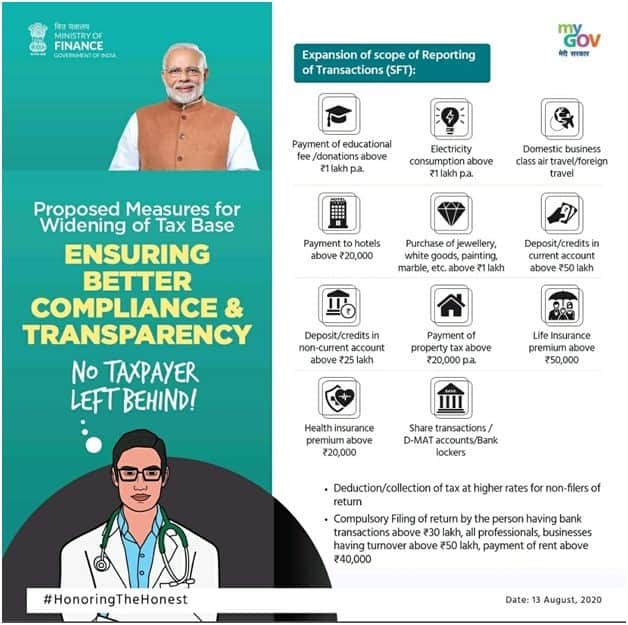
Prime Minister Narendra Modi on August 13 launched the 'Transparent Taxation' platform while announcing multiple reforms to improve tax compliance, faceless assessment and ease of filing returns. As part of the rehaul, the government has also proposed to reduce the threshold of various transactions for tax disclosure. This is aimed at widening the income tax base and checking tax evasion.
The list will now include white good purchases, property tax payment, medical and life insurance premium and even hotel payments.
So, the next time you pay a hotel bill or medical insurance premium of more than Rs 20,000, incur an expenditure exceeding Rs 50,000 on life insurance or over Rs 1 lakh for school fee, purchase white goods, jewellery, marble or paintings (see image below), be mindful that the entity you have made the payment to will be informing the government of your transaction.

Even payments made to the government such as property tax and electricity bills would be reported if they exceed Rs 20,000 and Rs 1 lakh, respectively. Business-class airline travel, whether domestic or foreign, would be reported, as per communication from the Ministry of Finance. These would be reflected in an individual's tax account statement called Form 26 AS.
“Earlier, a majority of the high-value transactions were linked to the financial sector such as banks, demat accounts, but now this move aims to bring everyone under the lens. So, even normal payments for school fees and white goods or painting purchases above Rs 1 lakh would be reported and even bank account deposits would be checked,” said Mehul Sheth, a chartered accountant.
Some of these had already been announced earlier during the Union Budget or are being captured through income tax returns. But a formal implementation has been announced. Under the existing scenario, property purchase above Rs 30 lakh, Rs 10 lakh invested in shares, mutual funds, demat, credit card and fixed deposit transactions above Rs 10 lakh were reported.
The limit for cash deposits in banks has been enhanced from Rs 10 lakh to Rs 25 lakh for savings account and Rs 50 lakh for current account. But, if you have bank transactions exceeding Rs 30 lakh then you would have to file a tax return, whether your transaction has been reported or not.
“Government has introduced new sections and is making reporting of certain transactions mandatory to unearth black money. This is because the number of people subjected to scrutiny is being reduced. The tax department wants to say have faith that taxpayers won’t be harassed as they are relying on data analytics,” said Ameet Patel, partner at Manohar Chowdhry & Associates.
While it remains to be seen how this would be implemented and whether individual taxpayers would be burdened with additional compliance. But since June 2020, many notices have been issued to taxpayers to verify whether they have incurred certain high-value transactions.
“Notices to confirm transactions reported under the taxpayers' PAN have already been issued based on the information reported to the government. The taxpayer simply needs to log-in to confirm whether the transactions belong to him or her,” says Patel. Once you verify or decline the transaction, the tax department would cross verify with your income tax returns if any.
The options for an individual include, whether the information is correct, wrong or duplicate. “If you decline the information then they would verify with the company that supplied the information. If you are proved wrong then you would have to revise your income tax return,” says Shah.
Another case in point is whether the threshold limits for certain transactions have been set low to include everyone under the tax net. A big group of diners at the restaurant would exceed Rs 20,000 in hotel bill, school payments have been exceeding the Rs 1 lakh mark for many, while Mediclaim premium would be beyond Rs 20,000 for a family for four.
“The threshold may seem low if we take into account bigger cities like Mumbai, Bangalore and Delhi, but they are reasonable from the government standpoint, which would take into consideration smaller towns,” says Patel.
Khyati Dharamsi :-moneycontrol.com
No comments:
Post a Comment